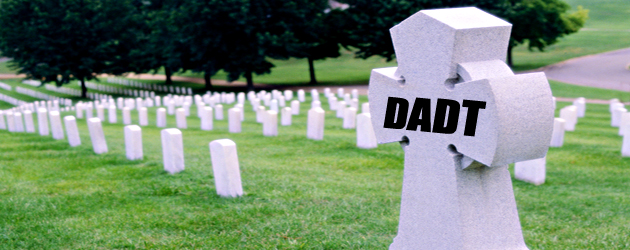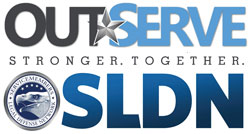 By: Chuck Colbert/TRT Reporter–
By: Chuck Colbert/TRT Reporter–
Two anti-gay measures have been introduced in the House Armed Services Committee in an apparent attempt to undermine the successful implementation of “Don’t Ask, Don’t Tell” repeal, a move advocates and defenders of openly gay military service say is unnecessary and unprecedented.
One proposal seeks to amend the 2013 National Defense Authorization Act by providing religious liberty protections to military chaplains and service members who disapprove of homosexuality on the basis of morality and religion.
Introduced by Representative Todd Akin (R-Missouri), the amendment states, “The armed forces shall accommodate the conscience and sincerely held moral principles and religious beliefs” of service members “concerning the appropriate and inappropriate expression of human sexuality and may not use such conscience, principles, or beliefs as the basis of any adverse personnel action, discrimination, or denial of promotion, schooling, training, or assignment.”
The other amendment, offered by Representative Steve Palazzo (R-Mississippi), would ban the use of Department of Defense military properties to “officiate, solemnize, or perform a marriage or marriage-like ceremony involving anything other than the union of one man and one woman.”
The two congressmen offered their amendments within hours of President Barack Obama’s full embrace of equal marriage rights for same-sex couples on May 9.
“At the end of the day, Mr. Akin is talking about a problem that does not exist,” said Army veteran Aubrey Sarvis, executive director of the Servicemembers Legal Defense Network, during a telephone press availability, Thursday, May 10.
“What is new here and unprecedented is that he’s seeking an exemption for individual service members and chaplains who may have a problem with gay men and lesbians serving openly in the military,” said Sarvis.
“[Akin] wants an exemption, or in his words protections, for that individual service member or chaplain to be able to express his opposition publicly to [military] policy as long as he wraps the expression of that policy [objection] to a moral principle or sincerely held religious belief,” Sarvis added.
“That would be a very dangerous precedent to set” insofar as “any number of policies or directives” with which a service member “might disagree” would be open to criticism, explained Sarvis.
For example, he said, “A service member might say, ‘It’s against my moral beliefs or principles to be serving with people of color.’”
For his part, Akin said in a statement, “We have heard stories of military chaplains facing censorship for their opposition to the liberal agenda. Liberals may have successfully ended ‘Don’t Ask, Don’t Tell,’ but they should not be allowed to force members of our military to give up their religious beliefs. That is simply unacceptable and unconstitutional.’
But Sarvis countered: Akin’s “alleged cases have not been documented and have not been investigated.”
Individual service members are “entitled to their personal, private beliefs and are perfectly free to hold them,” said Sarvis. “But they are not entitled to express publicly an objection or lobby against a policy” that has been ‘articulated’ either by ‘Congress or the president or secretary of defense or company commander or first sergeant.’”
Altogether, “Implementation [of DADT repeal] is working well, including on the religious front with chaplains,” Sarvis added.
Akin’s proposed amendment also addresses specifically the issue of a chaplain being forced “to perform any duty, rite, ritual, ceremony, service or function that is contrary” to his or her “conscience, moral principles, or religious beliefs, or contrary to the moral principles and religious beliefs of the endorsing faith group of the chaplain.”
That provision is unnecessary, said Sarvis.
“No chaplain is being required to perform any ceremony anywhere on or off base that he or she does not believe in or is inconsistent with the principles or teaching of his or her sponsoring agency,” Sarvis said. “It’s simply not happening.”
“Adequate protections are in place today to protect chaplains” in the performance of their duties in serving the spiritual needs of troops, added Sarvis.
During the press call Sarvis said that SLDN was not aware yet of any military chaplains who have performed same-sex marriages on military base facilities.
“We have heard from some service members who are in discussions with their chaplains about getting married this summer on military installations by military chaplains,” said Sarvis. “Stay tuned.”
Meanwhile, “The Department of Defense has already made it clear – and appropriately so – that decisions about the use of facilities should be made on a sexual orientation neutral basis,” Sarvis said.
A May 8 Army Times piece on Akin’s amendment prompted an online response from Sue Fulton, communications director of Out Serve, an organization for active LGBT military members
“You can preach to your own congregation that Judaism, Islam, Wicca, atheism is not the path to salvation – but as a chaplain you shouldn’t be preaching to your units that Jews, Muslims, Wiccans, or atheists should be kicked out of the military,” Fulton wrote. “Chaplains are sworn to support all soldiers; and if you can’t do that, it’s a violation of your oath.”
In his response, Army chaplain candidate Greg Brown wrote, “What this guy [Akin] is asking for is always the case. We are not required to do anything for anyone that our endorsing bodies wouldn’t approve of.”
© Copyright. Chuck Colbert. All rights reserved.







